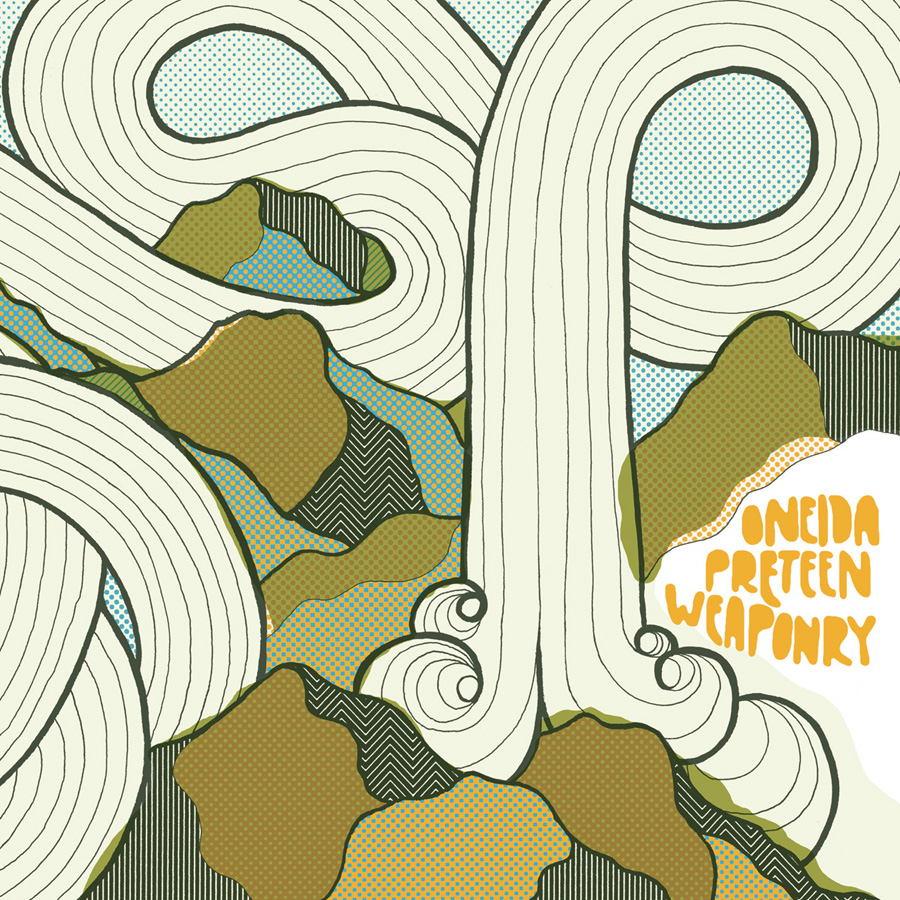 Oneida -- Preteen Weaponry (Jagjaguwar)
Oneida -- Preteen Weaponry (Jagjaguwar)Over the past few records, Oneida’s focus had shifted from aggressive Krautrock to winsome psychedelia, especially on the lovely album The Wedding. This album was the most song-based Oneida album yet.
Apparently, rather than continue down that path (perhaps a case of "been there, done that"), the New York trio instead went in the exact opposite direction. Preteen Weaponry isn’t just an album title -- it’s the only song on the album. It’s a winding 40 minute opus, maximizing the minimalist side of this always intriguing band.
Unlike the band’s typical Krautrock excursions, this is extremely subtle music. In particular, Kid Millions’s drums are not harsh and metronomically pounding. Well, at least they aren’t harsh. This album comes across as a soundtrack to a black-and-white movie set in an economically depressed factory town.
Consistent with the band’s previous stretched out excursions, repetition is central to the work. The band establishes a tempo and pattern. From there, little elements come in and out of the song. These subtle changes might not be immediately noticed, but they are what keep this composition for being too static.
The CD is banded so that the composition has three parts, or movements. The first part of "Preteen Weaponry" begins with keyboard drone and tapping on the cymbals. The guitar then begins to squall, and the keyboards, in an early Pere Ubu fashion, do the same. A minute-and-a-half into the track, the drums begin to pound out the basic rhythm, and the droning begins to take structure. One keyboard part plays a rhythm that knots together with the drum pattern. And the guitarist begins to accent these sounds with little bits of leads.
The drumming then picks up the pace. A second keyboard part comes in, with deep, resonant bass tones. The effect is three or four different rhythms interlocking, with each component taking up a slightly different place in the mix. Thanks to Millions, this is fairly driving and overall, the music is hypnotic. Little variations creep in and out during the 14 minutes of this first movement.
As the first movement fades out, loud ugly synths bleat out, and slight marital drums create a more ominous atmosphere, which is really saying something after the first movement. As the drums slowly and insidiously beat out a signal, the synthesizer swells in and out. The effect is more like bursts of magma under the surface of a volcano than the crash and recession of ocean waves. The guitar again plays a secondary role, embellishing on the fury from the other instruments.
Almost seven minutes into the second movement, there is finally singing. A disembodied psychedelic melody is overlaid upon the mix of pure synth noise and the constant drum pattern. The words are hard to fully discern, but the mood of the music and the sound of the vocals make this an aural version of a nightmare.
The third movement is less harsh, and the initial waves of keyboards sound a bit spacey -- the soundtrack for a starry night. Yes, the sci-fi sounds at times sound like a corrugated version of the liquid tones of Robert Fripp. They are complimented by busier drumming, with lots of snare and cymbals. Here, the guitar seems to have disappeared entirely. It’s drone, drums and space sounds.
This portion is the least layered of the three. It also has the least variation -- the drumming is what keeps it interesting, and 14 minutes is a lot for any drummer to carry. Therefore, I don’t find it to be as effective, though it is certainly consistent with the overall approach to this song.
This is the first of a planned trilogy. This album isn’t something I’ll play much, if I ever play it again. Which isn’t to say that it’s a bad record, but I appreciate it more at an academic level than any other way. I think that it would be best to hear Oneida perform it live (even though it was basically recorded live in the studio), as I can only imagine these guys would push this material into new shapes and sounds. It’s not a failure by any means, but it’s a very limited success on its own terms.





No comments:
Post a Comment